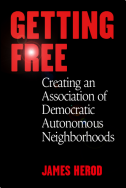
|
|||||||
Three Earlier Books Selected Papers Bibliography (2002) Bits & Pieces Short Takes on Flawed Books Nothing Posted Here Yet Movie Notes Nothing Posted Here Yet Reading Notes Nothing Posted Here Yet
Selected Correspondence Nothing Posted Here Yet |
|||||||
|
|||||||
Essays by other authors Nothing Posted Here Yet Sort by Books by other authors Nothing Posted Here Yet Sort by |
|||||||
|
||||||||
The Mistaken Equation of Militancy and Direct Action with Street Fighting A Note on Severino’s "Reforming the James Herod By my reading, an assumption present throughout this short essay is that militancy and direct action means street fighting. Severino writes: "...we would like the black bloc to serve as a link between communities and militant, direct-action oriented anarchists..." The implication here is that communities are not militant and do not practice direct action. When he says that "struggles that choose morality over tactics and fail to face the enemy head on are doomed to failure," I take it that by "facing the enemy head on" he means street fighting -- fighting cops and perhaps breaking bank windows. My apologies if I’m reading this wrong, but street fighting seems to be assumed throughout. He writes that "direct action on a mass level often requires precision and planning," and that "the black bloc cannot be a mob of people running in any direction that is either away from police or where the person with the loudest voice is yelling." He wants to "see militant tactics become a more frequently used tool in grassroots struggles," and he thinks it is a "matter of striking directly those who are the enemies in the struggle in question." But since he hasn’t mentioned anything else, but has talked from the beginning about "the street aspect of our struggle," I assume, once again, that he means street fighting. It is surely mistaken though to equate militancy and direct action with street fighting. Occupying a factory, apartment building, or university are examples of direct action, and these actions certainly require militancy. Breaking into a draft registration office and destroying files is a militant direct action. Calling a meeting at work to deal with the oppression there is a militant direct action. There are hundreds of militant direct actions that have nothing to do with demonstrations in the streets or confronting the cops there. There are many sites where we could be "facing the enemy head on." So the question arises as to whether streets are a good place to be doing this? Are streets really a good battleground for our struggle? I don’t believe that they are. I don’t believe that capitalism can be destroyed in the streets, nor can anarchism be built there. So for me the argument about whether we are going to have peaceful, nonviolent demonstrations, or militant ones that "strike at our enemies" (fight the cops? burn cars? break windows?) misses the point. Why have demonstrations at all? Why not pick other battlegrounds where we could destroy capitalism, and where we could create the social world we want? The idea that the only way, or main way, or best way to confront our rulers is to "take to the streets" is quite erroneous, as is the claim that people who take to the streets and fight the police are "militant" whereas others aren’t. Taking to the streets is not a strategy, it is a bad habit. I have spelled out in some detail an opposing approach to revolutionary anarchist strategy in my small book, Getting Free: Creating an Association of Democratic, Autonomous Neighborhoods, which is available on the web here. There is a supplementary essay attached to it that is also relevant to this discussion, namely, The Weakness of a Politics of Protest.
|
||||||||
